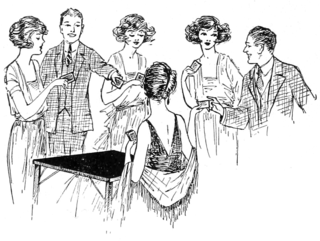 W
WParty games are games that are played at social gatherings to facilitate interaction and provide entertainment and recreation. Categories include (explicit) icebreaker, parlour (indoor), picnic (outdoor), and large group games. Other types include pairing off (partnered) games, and parlour races. Different games will generate different atmospheres so the party game may merely be intended as an icebreakers, or the sole purpose for or structure of the party. As such, party games aim to include players of various skill levels and player-elimination is rare. Party games are intended to be played socially, and are designed to be easy for new players to learn.
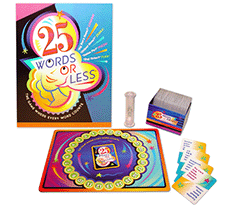 W
W25 Words or Less is a party board game in which two teams of players take turns bidding words back and forth, until one team allows the other to try to give that number of clues to their team to try getting five words from a card in only one minute. It was first published by Winning Moves Games USA in 1996 and was republished in 2006 as 25 Words or Less: People, Place and Things Edition. The game is no longer in production.
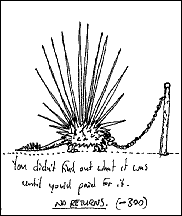 W
W1000 Blank White Cards is a party game played with cards in which the deck is created as part of the game. Though it has been played by adults in organized groups worldwide, 1000 Blank White Cards is also described as well-suited for children in Hoyle's Rules of Games. Since any game rules are contained on the cards, 1000 Blank White Cards can be considered a sort of nomic. It can be played by any number of players and provides the opportunity for card creation and gameplay outside the scope of a single sitting. Creating new cards during the game, dealing with previous cards' effects, is allowed, and rule modification is encouraged as an integral part of gameplay.
 W
WAlias is a board game, where the objective of the players is to explain words to each other. Hence, Alias is similar to Taboo, but the only forbidden word in the explanations is the word to be explained. The game is played in teams of varying size, and fits well as a party game for larger crowds. The game is very competitive.
 W
WApple bobbing, also known as bobbing for apples, is a game often played on Halloween. The game is played by filling a tub or a large basin with water and putting apples in the water. Because apples are less dense than water, they will float at the surface. Players then try to catch one with their teeth. Use of arms is not allowed, and the hands are often tied behind the back to prevent cheating.
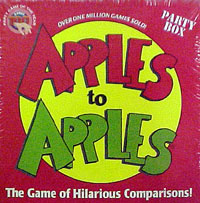 W
WApples to Apples is a party game originally published by Out of the Box Publishing Inc., and now by Mattel. Players start with a hand of seven "red apple" cards, which feature nouns. A player is selected to be the first judge, and that judge plays a "green apple" card, which features an adjective. The round is won by playing the "red apple" card that the judge determines to be the best match for the "green apple" card. The role of the judge rotates, and the number of rounds is determined by the number of players. The game is designed for four to ten players and played for 30–75 minutes.
 W
WBeasts of Balance is a dexterity tabletop game which is played alongside a companion app for iOS and Android. The game was developed by Sensible Object and released in November 2016, its soundtrack was composed by Disasterpeace. Originally titled Fabulous Beasts, the game had to be renamed following a trademark dispute with Warner Bros. over their Fantastic Beasts film.
 W
WCards Against Humanity is an adult party game in which players complete fill-in-the-blank statements using words or phrases typically deemed offensive, risqué or politically incorrect printed on playing cards. It has been compared to the 1999 card game Apples to Apples and originated from a Kickstarter campaign in 2011. Its title refers to the phrase "crimes against humanity", reflecting its politically incorrect content.
 W
WCarnelli is a parlor game created by Jan Carnell, a member of the Metropolitan Washington chapter of Mensa. This game has been popular at Mensa gatherings for years, and has turned up at science fiction conventions as well. It can be called a "title association" game, like "word association" only using titles, such as those of a book, play, movie, or song.
 W
WCharades is a parlor or party word guessing game. Originally, the game was a dramatic form of literary charades: a single person would act out each syllable of a word or phrase in order, followed by the whole phrase together, while the rest of the group guessed. A variant was to have teams who acted scenes out together while the others guessed. Today, it is common to require the actors to mime their hints without using any spoken words, which requires some conventional gestures. Puns and visual puns were and remain common.
 W
WThe Contender: The Game of Presidential Debate is a United States presidential election debate-themed party game using cards. The objective of the game is to use Argument Cards to win a mock presidential debate between other potential candidates. Players take turns debating an issue drawn from a deck of Topic Cards using phrases from the Argument Cards, creating the most convincing or entertaining argument. The game's development originated from a successful Kickstarter campaign, receiving acclaim for its simple concept backed up by its satirical, mature content.
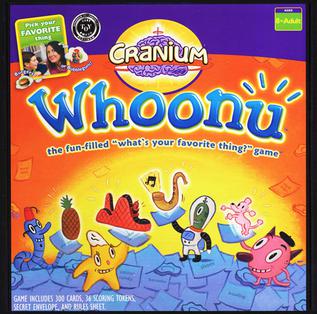 W
WCranium Whoonu is a party game manufactured by Cranium, Inc. Whoonu is billed as "the fun-filled 'what's your favorite thing?' game".
 W
WDizzy bat is a drinking game in which the participant chugs a full beer out of the holding end of a Wiffle ball bat. While the person is chugging, the surrounding participants count off in seconds how long it takes for the person to finish the full beer. The other players cannot stop shouting numbers until the batter turns the bat upside down to prove that every last drop has been consumed.
 W
WDonkey, also known as Pig, is a collecting card game that is best for five or six players. It is played with a 52-card French pack. It has variants such as Spoons and may be descended from an old game called Vive l'Amour.
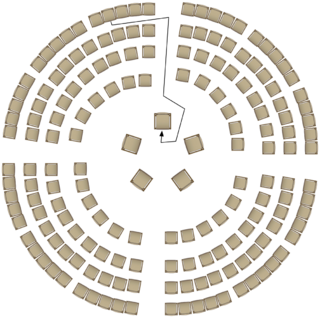 W
WA fishbowl conversation is a form of dialog that can be used when discussing topics within large groups. Fishbowl conversations are sometimes also used in participatory events such as unconferences. The advantage of fishbowl is that it allows the entire group to participate in a conversation. Several people can join the discussion.
 W
WGift Trap is a 2006 indie party board game, invented by Nick Kellet. Gift Trap is billed as "The hilarious gift-exchange party game". Gift Trap relies on the players' personal knowledge of each other, requiring the matching of the right gift to the right person.
 W
WHavok & Hijinks is a card game designed and published by Epic Slant Press LLC in 2014. In it, participants play a baby dragon searching to fortify their hoard, with the goal to be the first player to obtain 15 points worth of treasure. Designed to allow for fast matches, games generally last between 15 and 30 minutes and can be played by two to four players.
 W
WHunt the thimble is a party game in which one person hides a thimble, or other small object, somewhere in the room, while all other players wait outside. When everyone comes back in, they race to locate the hidden object. The first to find it is the winner, and hides it for the next game.
 W
WJenga is a game of physical skill created by British board game designer and author Leslie Scott, and currently marketed by Hasbro. Players take turns removing one block at a time from a tower constructed of 54 blocks. Each block removed is then placed on top of the tower, creating a progressively more unstable structure.
 W
WJungle Speed is a card game created by Thomas Vuarchex and Pierric Yakovenko in 1991. First self-published and now published by Asmodee Editions, it is played with non-standard playing cards. An expansion and all-in set have been published.
 W
WKaraoke is a type of interactive entertainment usually offered in clubs and bars, where people sing along to recorded music using a microphone. The music is an instrumental version of a well-known popular song. Lyrics are usually displayed on a video screen, along with a moving symbol, changing colour, or music video images, to guide the singer. In Chinese-speaking countries and regions such as mainland China, Hong Kong, Taiwan and Singapore, a karaoke box is called a KTV. The global karaoke market has been estimated to be worth nearly $10 billion.
 W
WLimbo is a popular game, based on traditions that originated on the island of Trinidad. The aim is to pass forwards under a low bar without falling or dislodging the bar.
 W
WThis is a list of drinking games. Drinking games involve the consumption of alcoholic beverages. Evidence of the existence of drinking games dates back to antiquity. They have been banned at some institutions, particularly colleges and universities.
 W
WMilk chugging, or the gallon challenge or milk challenge, is the sport of consuming a large amount of milk within a set period of time. Although there are variations in procedure, the general parameters are that a person is given 60 minutes to drink one US gallon of whole milk without vomiting. A gallon milk jug is a common size of milk container in the United States.
 W
WMurder mystery games are generally party games in which one of the partygoers is secretly playing a murderer, and the other attendees must determine who among them is the criminal. In some styles of game, the murderer may be aware that they are the killer and in other games the murderer discovers this along with the other participants. Murder mystery games may involve the actual 'murders' of guests throughout the game, or may open with a 'death' and have the rest of the time devoted to investigation.
 W
WMusical chairs, also known as Trip to Jerusalem, is a game of elimination involving players, chairs, and music. It is a staple of many parties worldwide.
 W
WParty Golf is a realtime, multiplayer golf game, developed by Australian game developer Giant Margarita. The game is a multiplayer twist on the popular golf video game genre. The aim is for players to race to the hole, and attempt to be first to sink their ball. The core rules of the game can be customized to allow a variety of different factors to influence winning. The game features a large amount of customization, including support for up to 8-person multiplayer. The game launched for the PlayStation 4 in the PSN EU region on October 4, 2016. A North American PlayStation 4 regional launch occurred on October 26, 2016, with a simultaneous release on Steam. The game launched for the Nintendo Switch worldwide on October 19, 2017, and this version can support up to eight players with individual Joy-Con controllers.
 W
WPass the parcel is a classic British party game in which a parcel is passed from one person to another.
 W
WExquisite corpse, also known as exquisite cadaver, is a method by which a collection of words or images is collectively assembled. Each collaborator adds to a composition in sequence, either by following a rule or by being allowed to see only the end of what the previous person contributed.
 W
WPin the tail on the donkey is a game played by groups of children. The earliest version listed in a catalog of American games compiled by the American Game Collectors Association in 1998, is dated 1899, and attributed to Charles Zimmerling.
 W
WA piñata is a container, often made of papier-mâché, pottery, or cloth, that is decorated, filled with candy, and then broken as part of a celebration. Piñatas are commonly associated with Mexico. The idea of breaking a container filled with treats came to Europe in the 14th century, where the name, from the Italian pignatta, was introduced. The Spanish brought the European tradition to Mexico, although there were similar traditions in Mesoamerica, such as the Aztecs' honoring the birthday of the god Huītzilōpōchtli in mid-December. According to local records, the Mexican piñata tradition began in the town of Acolman, just north of Mexico City, where piñatas were introduced for catechism purposes as well as to co-opt the Huitzilopochtli ceremony. Today, the piñata is still part of Mexican culture, the cultures of other countries in Latin America, as well as the United States, but it has mostly lost its religious character.
 W
WThe saltine cracker challenge or saltine challenge is a food challenge or competition in which a person has 60 seconds in which to eat six saltine soda crackers without drinking anything.
 W
WSecret Hitler is a hidden identity social deduction party game developed by Goat, Wolf, & Cabbage LLC, manufactured by Breaking Games and distributed by Blackbox. The board game was designed by Max Temkin, Mike Boxleiter and Tommy Maranges, with artwork created by Mackenzie Schubert, and first released on August 25, 2016. In Secret Hitler, players assume the roles of liberals and fascists in the Reichstag of the Weimar Republic, with one player becoming Hitler. To win the game, both parties are set to competitively enact liberal and fascist policies, respectively, or complete a secondary objective directly involving Hitler.
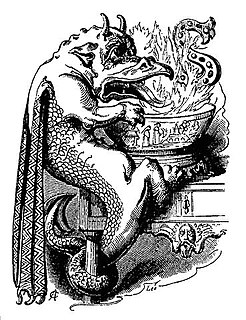 W
WSnap-dragon was a parlour game popular from about the 16th century. It was played during the winter, particularly on Christmas Eve. Brandy was heated and placed in a wide shallow bowl; raisins were placed in the brandy which was then set alight. Typically, lights were extinguished or dimmed to increase the eerie effect of the blue flames playing across the liquor. The game as described in Samuel Johnson's Dictionary of the English Language (1755) as "a play in which they catch raisins out of burning brandy and, extinguishing them by closing the mouth, eat them." According to an article in Richard Steele's Tatler magazine, "the wantonness of the thing was to see each other look like a demon, as we burnt ourselves, and snatched out the fruit." Snap-dragon was played in England, Canada, and the United States, but there is insufficient evidence of the practice in Scotland or other countries.
 W
WSpin the bottle is a kissing party game played at teenage parties comprising boys and girls.
 W
WSplat the rat, also known as bat the rat, is a simple variant on a bat and ball game that can be played at parties or fêtes.
 W
WStrip poker is a party game and a variation of the traditional poker where players remove clothing when they lose a round. Any form of poker can be adapted to a strip form; however, it is usually played with simple variants with few betting rounds, like five-card draw. Strip poker can be played by single-sex groups or by mixed groups in social situations and intended to generate an atmosphere of fun and to lighten the social atmosphere by the removal of clothing. Sometimes the game is played to heighten the sexual atmosphere, though the game itself is regarded as non-sexual. Like other adult party games, activities besides removing clothing and playing cards might be involved. Strip poker has also been adapted for a person to play alone, either by use of video games or online; and several television shows have been based on the game.
 W
WTaboo is a word, guessing, and party game published by Parker Brothers in 1989. The objective of the game is for a player to have their partners guess the word on the player's card without using the word itself or five additional words listed on the card.
 W
WThe Big Taboo is a variation on the board game Taboo. It incorporates elements from games like Pictionary, Charades, and 25 Words or Less to create a party game with "a little bit of everything". The game was published in 2008 by Winning Moves Games USA and is no longer in production.
 W
WThe floor is lava is a game in which players pretend that the floor or ground is made of lava, and thus must avoid touching the ground, as touching the ground would "kill" the player who did so. The players stay off the floor by standing on furniture or the room's architecture. The players generally may not remain still, and are required to move from one piece of furniture to the next. This is due to some people saying that the furniture is acidic, sinking, or in some other way time-limited in its use. The game can be played with a group or alone for self amusement. There may even be a goal, to which the players must race. The game may also be played outdoors in playgrounds or similar areas. Players can also set up obstacles such as padded chairs to make the game more challenging. This is a variation of an obstacle course.
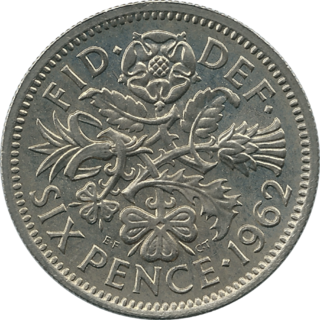 W
WUp Jenkins, also known by the shortened name Jenkins, is a party game in which players conceal a coin in their palm as they slap it on a table with their bare hands. The goal of the game is for the players on the team without the coin to correctly identify which hand the coin is under. The game typically consists of two- to four-player teams, one on each side of a table. There are no official rules, so rules may vary widely, the game is often played with alcohol beverages with which to drink as a forfeit.
 W
WWhat Do You Meme? is a humorous party card game in which players propose caption cards as a match to a designated photo card. The judge of the round chooses the caption that they think is the best match to photo card, and whoever played that card gets a point. The name of the game refers to internet memes and is a play on the term what do you mean? The game has been compared to Cards Against Humanity given the similar format. The game was created by Elliot Tebele and Ben Kaplan in 2016, and in 2017 was the 9th best selling game on Amazon.
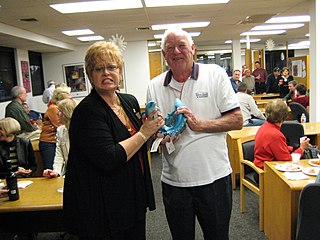 W
WA white elephant gift exchange, Yankee swap or Dirty Santa is a party game where amusing and impractical gifts are exchanged during festivities. The goal of a white elephant gift exchange is to entertain party-goers rather than to gain a genuinely valuable or highly sought-after item.